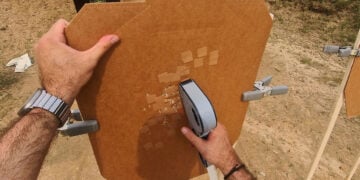Most of us who train with our firearms have inevitably hit a plateau in our progress as shooters. Most of us don’t dry fire as we should. Most of us don’t train with the focus necessary to advance our skills in a meaningful way. Only a very small percentage of the population has the discipline necessary to do these things. I, for one, lack that discipline, but I still do it. Thankfully I have a cheat code, a training partner, and a couple, actually.
The Importance of Accountability in Firearms Training
Training partners keep you accountable. I have had plenty of days that I got home from work and wanted nothing more than to crack open a cold one and veg out on PlayStation with my son. Then before I even made it to the fridge, my phone would buzz. My best friend, Damian, sends me a text about a breakthrough he had in dry fire and asks what I worked on today. So instead of getting a beer and couch surfing, I would head into my dry fire dojo to “do the thing.”
If you’re looking to improve your firearms skills, incorporating dry fire practice into your training regimen can be highly beneficial. Dry fire practice is a form of training that involves practicing your shooting skills with an unloaded firearm. It can help you improve your accuracy and speed without the added expense of live ammunition. To get started with dry fire practice, check out this article, Suggestions for Efficient Dry Fire Practice at Home, which provides tips and techniques for effective dry fire practice at home. It includes instructions on setting up a safe and effective dry fire practice area, as well as recommended drills to improve your shooting skills. By adding dry fire practice to your training routine, you can accelerate your progress and become a better shooter.
How Healthy Competition Can Elevate Your Firearms Skills
Having a training partner who is close to you in skill level can be highly beneficial for improving your firearms skills through healthy competition. When you have a partner who is at a similar level, you can engage in a friendly competition that pushes both of you to improve. This competitive aspect of training can motivate you to work harder, stay more focused, and be more dedicated to your training regimen.
The “iron sharpens iron” saying is especially relevant when it comes to firearms training. When two skilled shooters engage in healthy competition, they challenge each other to become better. They can exchange tips and techniques, provide constructive feedback, and help each other identify areas for improvement. This can lead to more rapid progress than training alone, as you can learn from your partner’s successes and mistakes.
Having a training partner can also help you simulate real-world scenarios and add an extra layer of complexity to your training. You can practice shooting while moving, engage in friendly matches, and even time each other’s drills to add a sense of urgency and pressure. With this competitive edge, you can accelerate your progress and become a better shooter.
The Power of Support: Mental Training for Firearms Enthusiasts
Your training partner needs to be someone whom you trust, a confidant. Anyone who has trained seriously in any discipline will tell you there are just as many, if not more, mental hurdles as there are physical. Having someone to talk it out with or even something as simple as building you up is invaluable to training gains.
For quite a long time, I struggled shooting at 25 yards and farther. It took a few phone conversations with Damian asking leading questions, but he essentially led me to my discovery that my issues at 25 yards were purely in my head. My scores have since gone from the mid-80s on a B8 to the mid to high 90s. Damian had been struggling with his draw in dry fire for quite some time until I showed him slow-motion footage of himself drawing at the same speed as I was. We talked it out, and he came to the realization he was allowing the timer to psyche him out. When he had other parts of the process to occupy him. We would both still be struggling with those individual challenges if not for each other’s support.
No one at your skill level? No Problem!
Now that being said, there is a good chance you may find yourself in a position where you are in a “skill desert” that is an excellent opportunity to mentor someone in the shooting sports and cultivate a training partner. Neill, another training partner of mine, started out as a complete novice when we began training together. Now he is nipping at my heels as far as skill goes. Cultivating him and showing him the basics, then watching him grow, has been one of the most rewarding experiences of my shooting career. I will never forget the lightbulb I saw go off over his head after I showed him the basics of properly gripping a pistol, and he was blowing the center out of the A zone at 7 yards when he previously could not even group. For his part, Neill has always been able to ground me when I start getting down about my shooting and remind me that I am comparing me to people in our peer group who are in the top one percent of shooters.
If the inverse is true and you are the “newbie,” don’t be afraid to try and befriend a more skilled shooter. Most would love nothing more than to help someone and pass along their knowledge.
The road map to success is staying consistent with your training partner. That can mean a lot of different things to your training. Ideally, you and your partner are going to take trips to the range, matches, or classes together. That being said, in the digital age, the hurdles of distance and schedule conflicts are nowhere near the obstacles they once were. For every range trip I take with a partner, I take two solo. But my training partners and I can still stay accountable and competitive with each other through the use of a logbook and video, both of which have a lot of utility beyond just accountability.
If you find yourself on a skill plateau, get a training partner. There are great people in this community who surely feel the same way you do. Help them and help yourself. The rewards extend far past just becoming a better gun hand. Friendships built on the range are some of the strongest I have, and being a good mentor is part of being a good steward of the second amendment.









